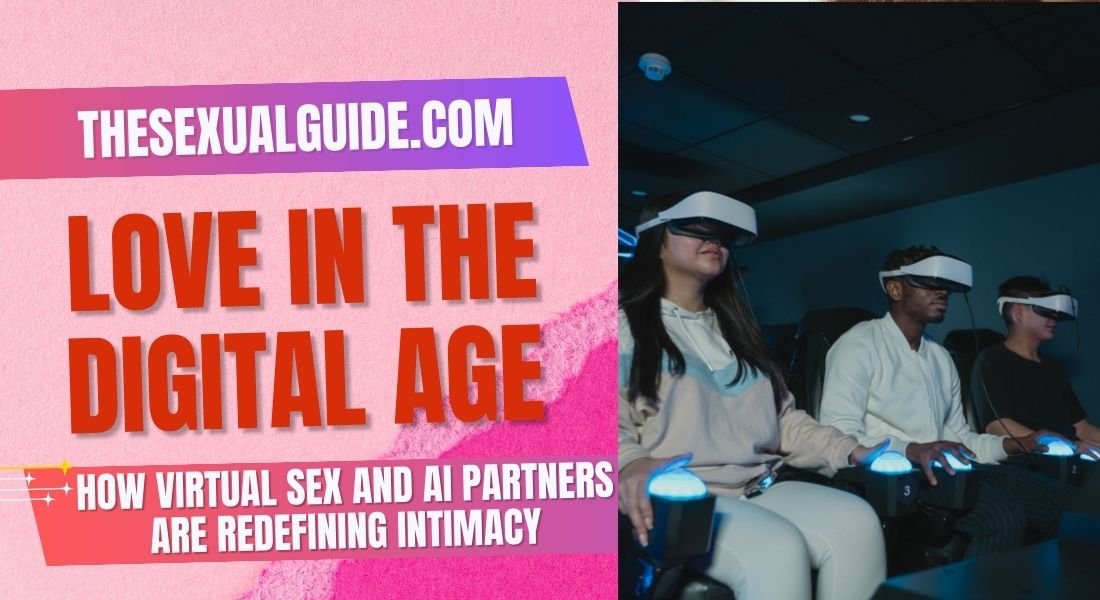In recent years, advancements in artificial intelligence (AI) and virtual reality (VR) have significantly transformed various aspects of our lives, including how we perceive and experience intimacy.
The emergence of virtual sex and AI partners is reshaping traditional notions of relationships and human connection.
The Evolution of Virtual Intimacy
From Chatbots to AI Companions
The journey began with simple chatbots designed to simulate human conversation.
Over time, these evolved into sophisticated AI companions capable of engaging in meaningful interactions.
Platforms like Replika offer users personalized AI friends, providing emotional support and companionship.
Some users have even developed deep emotional bonds with their AI counterparts, blurring the lines between human and machine relationships.
The Advent of Virtual Reality (VR) in Sexual Experiences
Virtual reality has introduced immersive experiences, allowing individuals to explore fantasies in controlled environments.
VR platforms provide users with realistic simulations, enhancing the sense of presence and intimacy.
This technology offers a safe space for individuals to experiment without real-world consequences.
The Impact on Human Relationships
Redefining Companionship
AI partners offer a form of companionship that is customizable and non-judgmental.
For individuals who struggle with forming traditional relationships due to social anxiety or other barriers, AI companions provide an alternative means of connection.
A study by the Institute for Family Studies found that 7% of young adults are open to the idea of having an AI romantic partner.
Addressing Loneliness and Social Isolation
In a world that’s becoming more digital, feelings of loneliness are frequently occurring.
AI companions can reduce these feelings by offering constant availability and personalized interactions.
However, it’s essential to consider whether these artificial relationships can truly replace human connection or if they might worsen social isolation in the long run.
Ethical and Psychological Considerations
Consent and Emotional Well-being
The development of AI partners raises questions about consent and the nature of emotional attachment.
While AI does not possess consciousness, the human tendency to anthropomorphize machines can lead to genuine emotional bonds.
It’s important to understand the psychological implications of these attachments and ensure that users maintain a healthy balance between virtual and real-world interactions.
Data Privacy Concerns
Engaging with AI companions often involves sharing personal information.
Users must be aware of data privacy issues, as interactions are typically stored and analyzed to improve AI responses.
Ensuring that companies prioritize user confidentiality and data security is paramount.
The Future of Intimacy
Integration of Advanced Technologies
As AI and VR technologies continue to advance, the line between virtual and physical experiences will blur further.
Future developments may include haptic feedback devices that simulate touch, enhancing the realism of virtual interactions.
These innovations could revolutionize how we perceive intimacy and relationships.
Societal Acceptance and Adaptation
The acceptance of AI partners varies across cultures and generations.
Younger individuals tend to be more open to these technologies, viewing them as extensions of their digital lives.
As societal norms evolve, the integration of AI in personal relationships may become more commonplace.
Addressing Erectile Dysfunction (ED) in the Context of Virtual Intimacy
For individuals experiencing erectile dysfunction (ED), virtual sex and AI partners can offer alternative avenues for sexual expression without the pressures associated with physical performance.
However, it’s essential to approach these alternatives as complementary rather than replacements for traditional treatments.
Trusted providers like LibidoDepot offer solutions to manage ED effectively, ensuring that individuals can maintain fulfilling intimate relationships in both virtual and real-world settings.
Conclusion
The rise of virtual sex and AI partners signifies a significant shift in how technology influences intimacy.
While these advancements offer new opportunities for connection and self-exploration, it’s essential to navigate them thoughtfully, considering the ethical, psychological, and societal implications.
As we move forward, maintaining a balance between embracing innovation and preserving the essence of human connection will be crucial.
Want to learn more? Visit LibidoDepot for trusted solutions.
Frequently Asked Questions About Virtual Sex, AI Partners, and Modern Intimacy
What is virtual sex and how does it work?
Virtual sex refers to sexual interactions facilitated by digital technology, including video calls, VR simulations, interactive adult content, and haptic devices that mimic physical touch, often enabling long-distance or tech-enhanced intimacy.
Can AI partners really provide emotional intimacy?
While AI companions can simulate emotional responses through natural language processing and machine learning, their ability to form authentic emotional bonds is limited. However, many users report feeling comfort, connection, and even romantic attachment.
Is virtual intimacy a replacement or enhancement of real-life relationships?
It depends on the individual. For some, virtual intimacy supplements real-world relationships (e.g., in long-distance settings), while for others, especially those with social anxiety or isolation, it may serve as a primary form of connection.
Are there any psychological or emotional risks associated with virtual sex and AI partners?
Yes. Over-reliance on digital intimacy may reduce real-world social engagement, create unrealistic expectations about relationships, or foster emotional dependency on non-human entities. Balance and mindful use are key to avoiding negative outcomes.
References
- Artificial Intimacy: Virtual Friends, Digital Lovers, Algorithmic Matchmakers
- My Chatbot Companion: A Study of Human-Chatbot Relationships
- Online Intimacy and Well-Being in the Digital Age
- Loving a 'Defiant' AI Companion? The Gender Performance and Algorithmic Gaze of Female AI in Otome Games
- The Effect of Flirting with a Virtual Agent on Attraction to Real Partners






